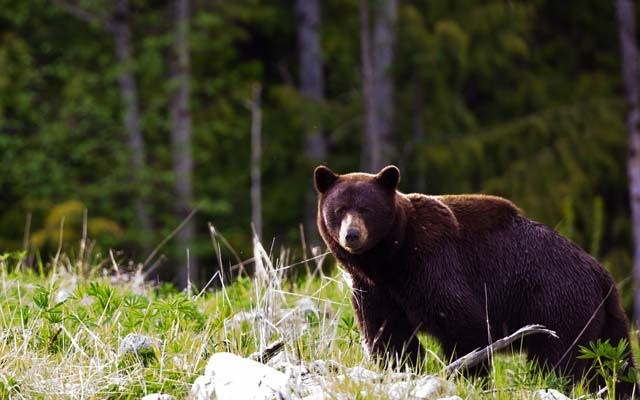It's the people. It's always the people.
Last week, nine bears were killed in three days in Revelstoke, a Bear Smart community, because people were not securing garbage and ripened fruit on garden trees.
One of the bears had to be shot dead in the downtown area in front of whoever was there after a merchant left open pails of waste food in a back alley that the bruin could simply not resist and then refused to leave.
"Outrageous," was how the conservation officer forced to kill the bears described the situation.
This week in Whistler we had the killing of a well-known adult bear, Michele, and one of her cubs, while another fell out a tree after being tranquilized, and died from the impact of the fall. The sow and her family had had no less than 13 calls for conflicts in the last couple of months.
Whistler's Get Bear Smart Society had asked that the trail that the mother bear and her cubs frequented be closed while the family foraged in the area — and that's a great idea — but closing a bear's range with the hundreds of people wandering the trails sounds challenging.
However, it's interesting to note that part of Lost Lake was successfully cordoned off and patrolled for the migration of toadlets.
This was a bear that had adapted to humans in her territory over the last decade. How is it that the bear family came to be killed?
It's the people, always the people.
We leave garbage around (did you see social media posts this week about an eatery forgetting to secure its garbage), we plant tasty bushes and trees too close to where we live, we don't give the bears enough room to live, we let our dogs run off leash even when signs are posted not to do so — just look at the number of trails that go through their home territories.
Bears may be adaptable but we are pushing the limits — there is no doubt that human-bear conflicts are going to continue especially with the sheer volume of people in the resort these days. And let's remember than many of the visitors have absolutely no idea about bears and keeping them safe.
That makes it likely that conservation officers will continue to be faced with situations where sows and cubs are in jeopardy. According to the Recommendations of the Orphaned Bear Cub Review Committee (2000) the government's position is that orphaned bears rarely survive and those sent to shelters to mature are often killed upon release due to habituation. Today, the killing of cubs by conservation officers is done on a case-by-case basis.
"When necessary they (the decisions to kill) are made in consultation between the provincial wildlife veterinarian, regional ministry wildlife biologists, and the conservation officer's supervisor, taking into account all facts available at the time," said the statement sent to online publication the National Observer recently. "Current procedures allow for bear cubs of the year to be rehabilitated at an approved facility if they are determined to be good candidates."
In this latest Whistler case the cub didn't meet the government's criteria for rehab and so it was killed.
It is tragic and heartbreaking enough when bears have to be killed because we habituate them to human food, but it is even more disturbing when they are killed because of poor policies that come out of Victoria.
That the policies need updating is without question. And along with that, a review of the science around the success of sending orphaned cubs to wildlife refuges also needs to take place.
The anecdotal evidence seems to support it, especially when the truth comes out about previous cases held up as failures. Take, for example, the two cubs released into the Kispiox Valley from a bear cub refuge last year. They began to source human food about four months after release and one of them ended up dead as a result.
But when the refuge further investigated the incident it was revealed that people were feeding the bear cubs dog food.
It's the people; it's always the people.
Since 2010, wildlife refuges in Alberta have been forbidden to take in bear cubs and all orphaned cubs are killed.
Surely that is not what we want here.
So, to start, support our Get Bear Smart Society and its policies and education endeavours however you can, pick up any garbage you see — don't just walk past it thinking it's someone else's problem, send a letter to our local MLA Jordan Sturdy (jordan.sturdy.mla@leg.bc.ca) asking for more support for our conservation officers, our bears and better policies to protect these amazing creatures.
Because it's the people, it's always the people, who need to create the solutions.




